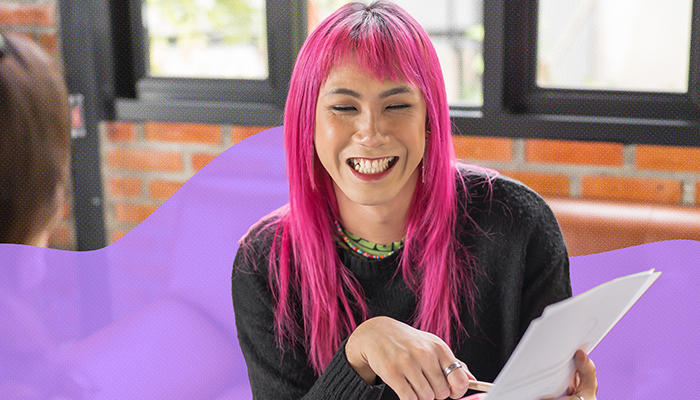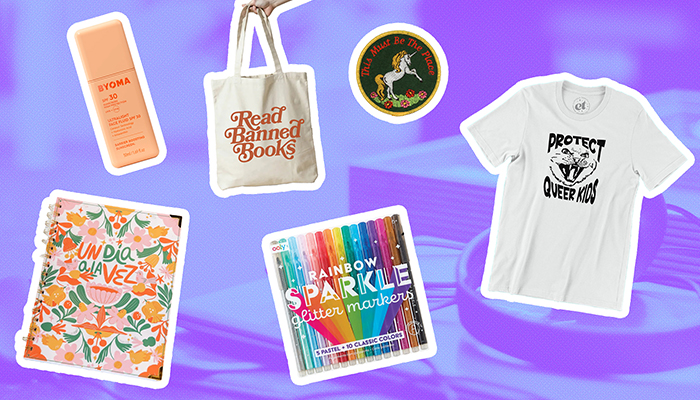Being misgendered can spark uncomfortable feelings: embarrassment, frustration, anger, resentment, sadness, gender dysphoria, distress, etc. Likewise, we may find ourselves at a loss for words when this happens. (I know I have, because it’s, like, really? You haven’t gotten it by now?) Especially when it happens multiple times with the same person, it can be a disheartening and discouraging experience for the person being misgendered. For better or for worse, if you've been misgendered, you’re not alone. Many people from all walks of their gender journeys have faced this awkward yet common scenario.
Being misgendered can be awkward for everyone involved
It's important to recognize there’s (usually) discomfort for all parties when someone is misgendered. Of course, there are people out there who blatantly misgender people with malice, but this article isn’t centering that experience, though we acknowledge how often it occurs in our anti-trans climate. Instead, we’re providing a resource for those who are misgendered by the ones they love and how to handle it plus giving tips to said loved ones who are looking to improve.
While the person being misgendered isn’t responsible for coddling the other person’s feelings, it can sometimes be difficult to understand social expectations if you’ve misgendered someone. If you’re interested in learning how to be a better cisgender ally to the transgender, nonbinary, Two Spirit, and gender nonconforming community, you’ve come to the right place.
For International Pronouns Day, we asked the FOLX community on how they correct someone who misgenders them, how to practice self-care if you’ve been misgendered, and what advice they’d offer to allies who’ve misgendered someone.
It’s also important to highlight that, while we polled community members on how they correct someone when they’ve been misgendered, many responded that they don’t correct the other person at all. The same people expressed fear, anger, and other uncomfortable feelings that come with confronting conflict when they feel unsafe—so know that you don’t have to correct people. Ultimately, you make the choice whether or not you want to correct someone and potentially disclose your identity to others.

How do you respond to someone when you’ve been misgendered?
In our survey, most respondents interject to correct the other person, some offer general guidance (such as not assuming another person’s gender), and others don’t correct at all. A few expressed hesitation to correct the other person because of their safety.
“I live in the southern states of the United States, so I typically don’t correct people because I don’t know who is ‘safe’” If they’re my friend, but they keep misgendering me, I’ll call them out like, ‘hey, I’ve told you my identity and pronouns and you don’t seem to respect that and that makes me feel unvalued, invalidated, and disrespected. Please stop.’ If they still keep misgendering me, then I know they’re not actually my friend and I stop talking to them. I deserve basic respect and consideration. That doesn’t make me selfish. I want to surround myself with supportive people who love and respect me and other people like me. There’s nothing wrong with that.” Maxwell (they/he)
“When I first came out [being misgendered] was constant, I would tell them not to assume, and if they weren’t sure [about my pronouns], to ask.” Rachel (she/her)
“I just correct them in a casual way, like ‘by the way, my pronouns are he/him, not (insert incorrect pronouns here’ and if they continue to consistently [misgender me], I take them aside to tell them how much it hurts me.” Orion (he/him)
“[It] depends on the relationship and my capacity in the moment. I try to gently and lovingly correct when I have the energy. I find that I have more capacity to correct when it is others who are being misgendered. I really appreciate it when others gently correct folks on my behalf.” Dexter (they/them)
“It depends. If it's someone I'll never see again, I ignore it. If it's a family member or friend or someone I work with, I just say, ‘I use he/they pronouns, please try not to call me by she/her pronouns.’” Ray (he/they)
What advice do you have for someone feeling sad, frustrated, or otherwise uncomfortable about being misgendered?
Many people offered words of affirmation to fellow trans and nonbinary community members. Some also stressed the importance of surrounding yourself with affirming, supportive, and loving people.
“Remember that you are who you are, period. If someone calls you a different thing, that doesn’t change who you are in the least. Stand up for yourself and be proud of who you are, but don’t base your self validation on other people.” Rachel (she/her)
“Find people who see you as you are and ask them to talk about you in third person. For me, it helps a lot.” Rex (he/him)
“Definitely have a support system or way of affirming yourself. It can be really tiring and exhausting being misgendered, but as long as you have someone who affirms you, it makes all the difference. If you don’t know anyone who can support you though, video games are a great tool. I often play as masculine characters and it makes me feel seen in a virtual space where anything can happen.” Nathan (he/him)
“Be patient with others, but don’t feel forced to stick around with someone who’s being ignorant. If someone isn’t willing to make an effort with your pronouns (or worse, is purposely misgendering you) they’re not worth your time.” Anonymous (they/he)
“Just remember that the haters are in the minority. A lot of people will support you if you speak up.” Maxine (she/her)
What advice do you have for allies when they misgender you or someone else?
Many of our community members emphasized the importance of moving on when they’ve been misgendered. The general consensus is that if it happens, the best practice is to correct yourself in the moment and proceed with the conversation. If you’re corrected on the spot, it’s also acceptable to thank the other person and continue talking. Read below for more of what members had to say.
“In my situation, I don't want a big attention or call out. Just do it right next time. In the context of the moment, if you catch it immediately, fine. I understand it is difficult to remember if you have known me one way for so long, but please just try. Read the name and say it in your head as that may help connect the right output. Most of these happen simply because folks are running parts of the conversation on autopilot.” Jennifer (she/her)
“A simple apology and correction. Please don't go into detail of why you made that slip up.” Alice (she/her)
“Don't make a big scene about it, just say the correct term and move on. If you think you're explaining why you misgendered us, you might end up making us dysphoric instead—i.e. ‘Sorry, it's the beard’—yeah. We know sometimes we don't exactly look the part, and we try not to dwell on that every second of the day.” Ruby (she/her)
“Just correct yourself and move on. Don't make a big deal about it, but also think about why you did it and consider why you don't truly see that person as the gender they are.” Lily (she/her)
“Usually a simple ‘Sorry, [correct pronoun],’ and then completing the phrase is fine. Additional apologies tend to just make the situation awkward (especially around others) and bring more attention to the knowledge of being misgendered than is comfortable. And of course, continuing to do your best to use the correct pronouns is always the best behavior.” Anonymous (he/they)
__
FOLX Health is the first digital healthcare company designed by and for the LGBTQIA+ community. Our services include virtual primary care, gender-affirming hormone therapy including estrogen and testosterone (HRT), mental health care, sexual and reproductive health care, preventive care, and fertility consultations. FOLX memberships give you access to LGBTQIA+ expert clinicians, peer support, thousands of LGBTQIA+ resources, and more. Whether you’re lesbian, gay, bisexual, transgender, queer, gender non-conforming, or nonbinary, you can find LGBTQIA+-specialized health care that helps you meet your wellness goals. FOLX Health is health care that's queer all year. Get all the benefits of becoming a FOLX member and sign up today!



